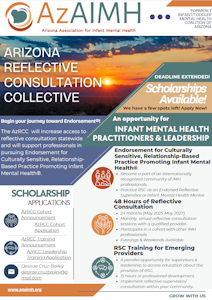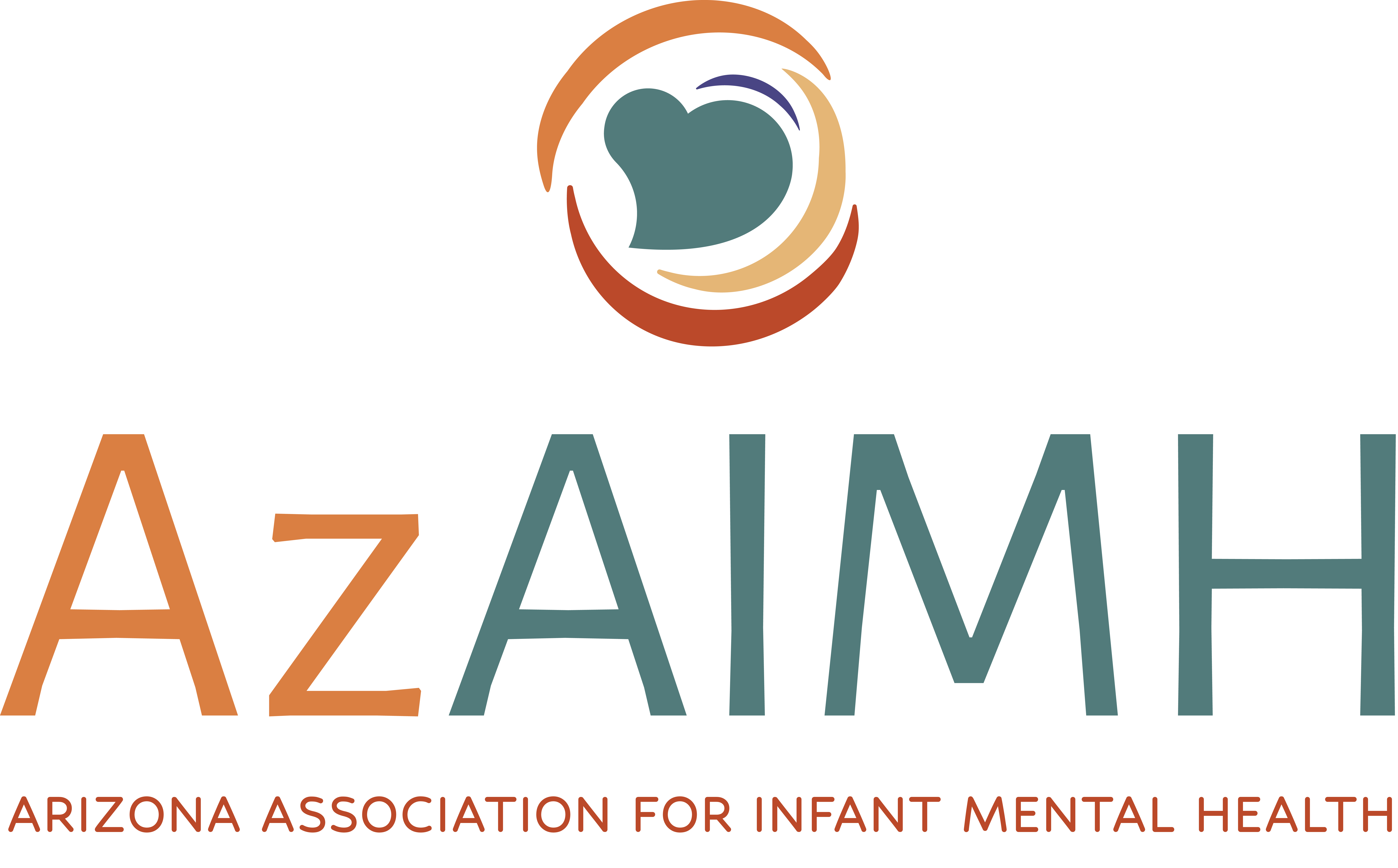ARIZONA REFLECTIVE CONSULTATION COLLECTIVE
 Who should participate in the AzRCC?
Who should participate in the AzRCC?
This opportunity is available for anyone working to support early relational health for pregnant people and children ages 0-3 years within the sectors of:
Promotion
Prevention
Intervention
Clinical Treatment
What is the AzRCC?
The Arizona Reflective Consultation Collective is an opportunity to receive reflective consultation in a cohort with other IMH professionals. The program is structured for professionals who are seeking RSC for the purpose of Endorsement®. The AzRCC will increase availability and accessibility for reflective consultation statewide and will support professionals in pursuing all categories of Endorsement®. The AzRCC is especially designed for professionals in leadership roles to build and strengthen their capacity for providing reflective supervision/consultation (RSC) as Endorsed Reflective Supervisors (ERS) or Infant Mental Health Mentors-Clinical (IMHM-C). The expansion of RSC in Arizona will directly benefit community organizations and their employees, along with improving outcomes for children and families.
What is included in the the AzRCC cohort program?
- This is a two-year program: May 2025 through May 2027.
- Participants receive 48 hours of reflective consultation with a qualified reflective consultation provider at a significantly reduced cost.
- Cohorts will be structured with five people per group.
- Virtual 2-hour monthly reflective consultation sessions
- Participants receive 6 hours of education as an orientation to the experience of reflective supervision/consultation.
- For IMH leadership/supervisors, the AzRCC is offering a parallel opportunity to accumulate an additional 15 hours of education about the provision of RSC at a significantly reduced cost.
The accumulated reflective consultation hours and education hours fulfill a large part of the requirement for Endorsement®.
RSC REquirements
What is reflective supervision/consultation (rsc)?
RSC is an ongoing professional development practice for the infant mental health (IMH) workforce. Through regularly scheduled reflective sessions, the IMH professional and their supervisor/mentor/consultant establish a collaborative and reflective alliance. RSC supports the professional in addressing the challenges of their work and leads to better service to families. The relationship, in which the professional feels seen, heard, and understood, provides a model for strengthening relationships and promoting the growth and development of infants, toddlers, and their caregivers.
Concretely, RSC provides a regular opportunity for a professional to talk about their work and the impact their work has on themselves and others. RSC fosters critical self-awareness and the ability to consider multiple perspectives, all of which enhance an organization’s implementation of a relationship-based culture.
Values and Beliefs About Reflective Supervision/Consultation (RSC)
Every professional supporting babies, young children, caregivers, and families deserves and benefits from a collaborative and consultative reflective relationship.
RSC has the capacity to facilitate social justice work through the practice of curiosity, self-awareness, and exploration of the parallel process.
RSC provides a space to identify bias, increase cultural humility, and explore the ways in which power, privilege, and systems of oppression impact both the reflective alliance and the work with young children and families.
The IMH field has a responsibility to ensure that RSC is offered and delivered across all disciplines and sectors of the workforce in an equitable, accessible, and culturally responsive way.
RSC is an inclusive practice, honoring and elevating diverse and non-dominant ways of knowing, doing, and being.
RSC providers must be engaged in ongoing learning and reflection, including participation in their own reflective practices about the RSC they are providing to others.
AzAIMH and the Alliance are committed to broadening pathways for professionals to meet RSC qualifications, with a particular focus on diversifying the pool of RSC providers.
AzAIMH and the Alliance are committed to our own critical self-awareness as we strive to deepen our understanding of RSC best practices.
What Is the Link Between Reflective Supervision/Consultation (RSC) and IMH Endorsement®?
RSC is good for the workforce. It offers a space for professionals to consider the impact of their work on families and on themselves. It provides emotional support to the practitioner so that they, in turn, can offer that support to families so that families can offer it to their infants and young children.
RSC is a requirement for most categories and a strong recommendation for all categories of the Infant Mental Health (IMH) Endorsement® credential; it offers a reflective “relationship for learning” through which professionals integrate IMH knowledge & skills into relationship-based practice.
RSC is linked to Endorsement® so that more professionals ask, “What about the baby?” which places the experience of the infant/young child at the center of the work.
The IMH Endorsement® credential provides best practice standards that define the qualifications for RSC providers. RSC qualifications ensure that providers participate in professional development (initial & ongoing) and are supported by their own reflective practices.
The primary objectives of RSC:
- Form a trusting relationship between supervisor and practitioner
- Establish consistent and predictable meetings and times
- Ask questions that encourage details about the infant, parent, and emerging relationship
- Remain emotionally present
- Teach/guide
- Nurture/support
- Apply the integration of emotion and reason
- Foster the reflective process to be internalized by the practitioner
- Explore the parallel process and allow time for personal reflection
- Attend to how reactions to the content affect the process
Directory of Reflective Supervision/Consultation Providers
Directory of Reflective Supervision/Consultation Providers
AzAIMH has organized this directory to help professionals around the state access RSC hours from qualified RSC providers. The individuals on this list have earned Endorsement® and have confirmed that they are meeting the Endorsement® requirements for RSC in that they are endorsed as an Infant Family Specialist or Infant Mental Health Specialist with the Endorsed Reflective Supervisor (ERS) Add-on (i.e., IFS-ERS or IMHS-ERS), or they are endorsed as an Infant Mental Health Mentor – Clinical (IMHM-C), and they are receiving their own RSC from a qualified provider.
The providers have indicated their willingness to provide RSC to professionals within Arizona. The list is not exhaustive of all qualified RSC providers within the state. RSC hours accumulated with these providers qualify for new Endorsement® applications and for Endorsement® renewal.
Please contact the provider directly to coordinate attendance or for additional information.
The Arizona Association for Infant Mental Health provides the directory as a service to its members. The individuals listed are independent providers and do not represent AzAIMH in the provision of reflective supervision/consultation services. Any action, advice, or services provided by such individuals are not facilitated by AzAIMH. The Arizona Association for Infant Mental Health cannot guarantee the accuracy, reliability, or completeness of supervision/consultation provided by these individuals. The AzAIMH does not receive payment or participate in the arrangements or contract negotiations.
Reflective Supervision vs. Reflective Consultation
Program Supervisor as Reflective Supervisor
If the reflective supervisor operates within an agency or program, then they will most likely address reflective, clinical/case, and administrative content. When the supervisor who is responsible for clinical and administrative supervision also is responsible for providing reflective supervision, it is preferable that they schedule a separate meeting that can be devoted just to reflective supervision time. Some supervisors may choose to address disciplinary concerns during the individual practitioner’s regular reflective supervision meeting. However, when doing so, the supervisor should put into a reflective context any concerns that they may have and share how these concerns may be related to the practitioner’s direct service and/or the intersection of personal and professional development. Disciplinary action should never occur within a group RSC session.
Contractual Reflective Consultants
Sometimes, an outside contractual consultant is hired to provide RSC to an individual or group on behalf of the promotion of IMH. In addition to possessing the knowledge and skills defined in Reflective Supervision/Consultation that Meets the Criteria for Endorsement® (pg. 13), it is recommended that the consultant be:
- Knowledgeable about the community in which the individual/group provides service
- Fully informed about and respectful of agency policies, regulations, protocols, and rules that govern the individual’s or group’s services as well as program standards and specific components of those services
- Knowledgeable and respectful of leadership roles within the agency
- Able to establish positive working relationships with agency personnel.
The consultant will engage in reflective case discussions but will discuss administrative content only when it is clearly indicated in the contract. When discussions related to disciplinary action need to occur, it is the direct supervisor (rather than the consultant) who should address such action.
“Although RSC may incorporate administrative and clinical tasks, and also include attention to collaboration within learning relationships, its primary focus is the shared exploration of the emotional content of infant and family work as expressed in relationships between infants, parents and practitioners and supervisors and practitioners.” Weatherston & Barron, 2009
Reference: Best Practice Guidelines for Reflective Supervision/Consultation, ©2018 Alliance for the Advancement of Infant Mental Health
Who is a "qualified provider" of RSC?
For the purpose of Endorsement®, a qualified RSC provider is endorsed as an IFS-ERS, IMHS-ERS, or IMHM-C. This requirement qualifies RSC hours for new Endorsement® applications and for ongoing Endorsement®renewal.
See IMH-E® Requirements for details about specific requirements.
Endorsed Reflective Supervisor (ERS) Add-On
As of January 1, 2025, providers of RSC are required to have the Endorsed Reflective Supervisor (ERS) credential added to their IFS or IMHS endorsement or be endorsed as an IMHM-C, so that their hours with supervisees/mentees meets requirements for the purpose of Endorsement®. This requirement qualifies RSC hours for new Endorsement® applications and for ongoing Endorsement® renewal.
Requirements for the ERS Add-On
Prerequisite: An applicant must be already endorsed as an Infant Family Specialist (IFS) or Infant Mental Health Specialist (IMHS) to apply for ERS.
Work:
- Minimum 1 year experience providing RSC to infant mental health professionals.
- Reflective Supervision/Consultation:
- Minimum 12 hours received from a qualified provider specifically about the provision of RSC to others.
Training: Minimum 15 hours specifically about the provision of RSC.
References: One from a reflective supervisor/consultant and one from a reflective supervisee/mentee.
Emerging ERS:
This classification allows for 2 years to acquire all the ERS requirements while being able to provide qualifying hours of RSC to others.
Applying for Endorsement®
RSC hours from a qualified provider are required to apply for these categories:
Infant Family Specialist (IFS): Minimum of 24 hours
Infant Mental Health Specialist (IMHS): Minimum of 50 hours
Infant Mental Health Mentor-Clinical (IMHM-C): Minimum of 50 hours
Additionally, RSC hours are required to apply for the Endorsed Reflective Supervisor (ERS) Add-On: Minimum of 12 hours of the required hours for IFS or IMHS must be about the provision of RSC.
See IMH-E® Requirements for details about specific requirements.
Endorsement® Renewal
Professionals holding Endorsement® as Infant Family Specialist, Infant Mental Health Specialist, and Infant Mental Health Mentor-Clinical are required to receive RSC from a qualified provider (IFS-ERS, IMHS-ERS, or IMHM-C).
A minimum of 12 hours of reflective supervision/consultation from a qualified RSC is required for renewal for these categories:
- Infant Family Specialist (IFS)
- Infant Mental Health Specialist (IMHS)
- Infant Mental Health Mentor-Clinical (IMHM-C)
The hours can be accumulated through individual or group sessions and in-person or virtual sessions.
The 12 hours of RSC should be accumulated over the course of at least 6 months.
Things to consider: A provider of RSC may not receive RSC hours from their supervisee/mentee for the purpose of renewal.
AzAIMH strongly recommends ongoing reflective supervision/consultation for all professionals in the IMH workforce due to the evocative nature of the work.

